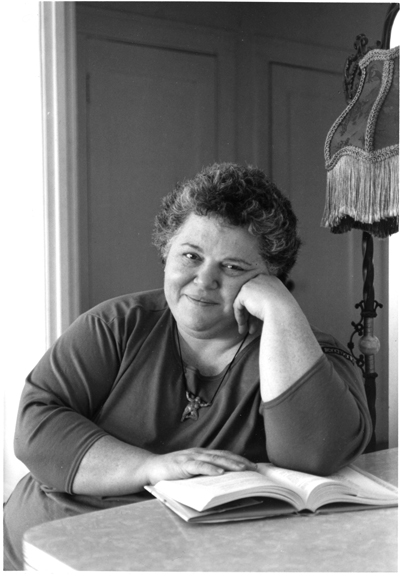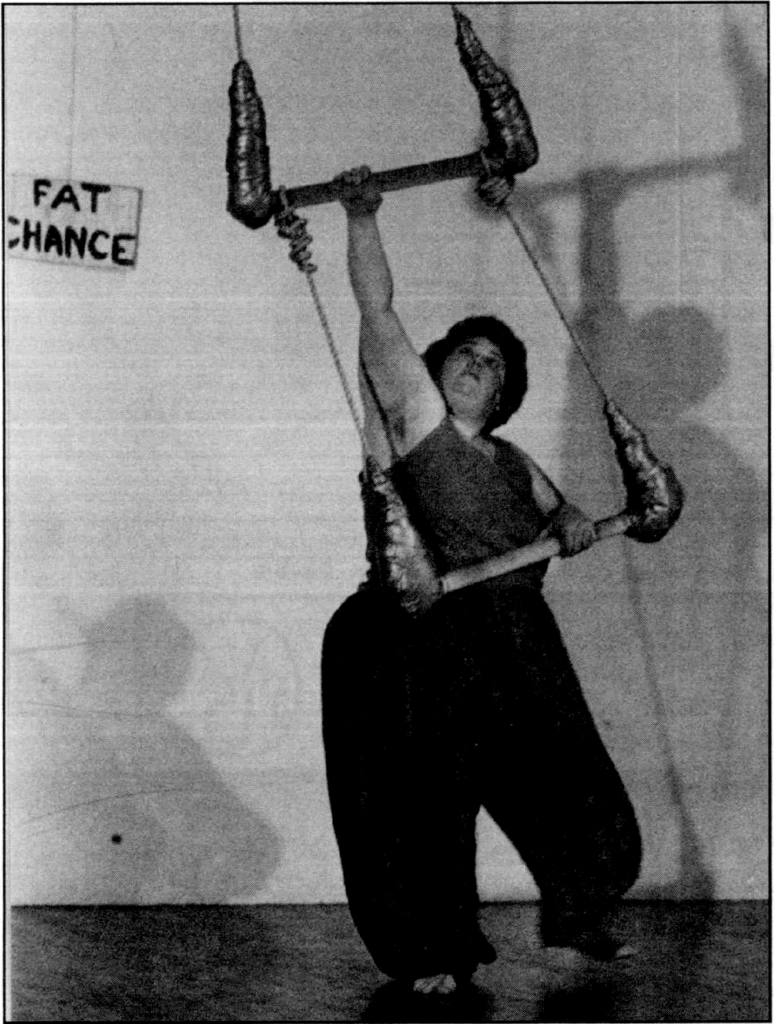Title: Judy Freespirit – A. Hernandez Talks to One of the Foremothers of Fat Activism
Date(s) of creation: October, 1994
Creator / author / publisher: Judy Freespirit, A. Hernandez, FaT GiRL
Physical description: Two pages of a zine, black and white text and photos.
Reference #: FG1-006-007
Links: [ PDF ]
From FaT GiRL #1, October, 1994

Cultural progression is usually assigned a maxim: the more things change, the more things stay the same. But when it comes to fat activism, it ain’t necessarily so. Just ask Judy Freespirit. As cofounder of the now defunct Fat Underground in 1972, the architect of Fat Chance, a fat women’s dance troupe, and the Fat Lip Readers Theater in the 1980s, Freespirit is the quintessential cultural worker whose name has been synonymous with the fat liberation movement for the past 23 years.
“It’s far from right-maybe in another 50 years-but compared to 23 years ago, it’s like night and day,” says the formidable fat activist who was caught up in the groundswell of the women’s movement before she turned her political antenna to grassroots fat activism in Los Angles during the ’70s.
The Fat Underground came on the heels of a burgeoning fat liberation group at the time, now known as the National Association to Advance Fat Acceptance or NAAFA. Back then, NAAFA’s tack on “civil rights for fat people was to do volunteer work for the Cerebral Palsy Association to show fat people were nice,” says Freespirit.
It was time for an alternative. Using the F-word without apology, the Fat Underground pricked the consciousness of a fat-phobic America with their clarion call for equal rights. The mission and philosophy behind the Fat Underground was simple enough: fat people rejecting the status quo.
“The basic message was that we should be treated decently. Stop making fun of us in the media,” says Freespirit. “One of the main pushes was at the medical treatment of fat women; doctors making you go on a scale, making you go on a diet for whatever you came in for; handing you a diet on your way out the door when you came in for a sprained ankle.”
Political action was swift; members of the Fat Underground wrote research articles and gender analysis on fat issues and published them in feminist and leftist magazines. Their guerrilla theater tactics were legendary-the women crashed behavior-modification weight-loss classes and read from their manifesto to captive audiences. But in the infancy of the fat liberation movement, the notion of egalitarian politics for fat people seemed like an anachronism in a predominantly thin world. “We would have community forums and invite people to come, but talk about fat liberation and they would snicker-they just didn’t get it,” remembers Freespirit, who was no stranger to such ignorance. Growing up under a fat oppressive scheme in Detroit, Michigan, herself, she was already on her first diet and popping doctor-prescribed amphetamines by the time she was eight years old. But it was the untimely death of singer “Mama” Cass Elliot of The Mamas & Papas in 1974 that put the fat liberation movement on the map and exposed the posturing of a skinny society.
“Things really took off when Cass Elliot died,” she says. “When she died, the news media thought it was really funny and they put that she died choking on a ham sandwich. It made us very angry and we got very pissed.”
Following the sensationalized media reports of her death, the Fat Underground appeared at a women’s equality day parade, sporting black armbands and candles for Elliot. In an unprecedented speech about institutional fat oppression, one of the members took to the main stage and publicly denounced the medical system for murdering the singer, who had been on a severe diet and had just lost 80 pounds at the time of her death. “Nobody had even really been talking until that time about the collusion of the medical establishment with killing us,” says Freespirit. “We were very serious.”

Today, the concept of fat liberation is no longer taboo and ”there’s more understanding in the general public. People don’t laugh anymore,” says the 58-year-old Freespirit. In the main, fat activism has gone high profile. Groups like NAAFA and the Fat Lip Readers Theater have appeared on Donahue, and TV shows like 48 Hours broadcast stories about the racket of the $30-billion-dollar diet industry. There’s even an International No Diet Day here and abroad.
“Overall, in the general minds of most Americans, there’s been a huge change,” says Freespirit. “There’s also a huge reaction-models are getting thinner and anorexia has become epidemic.” And how about in our own backyard? Unfortunately, the lesbian community can be a fallen culture too, particularly when it comes to body size and image.
Recently, she had a conversation with a woman starting up a lesbian matchmaking service in the Bay Area, “who is finding so much fat-phobia within the lesbian community,” says Freespirit, adding that those slim-and-fit-seeks-same personal ads in the lesbian and gay press amount to fat discrimination.
This bias often results in fat women being passed up in the hierarchy of the dating game and also perpetuates internalized fat oppression within the fat lesbian community, says Freespirit. “In terms of sexual stuff, it’s harder for fat women to find lovers, it’s just a fact. It’s not right. It’s not good,” she says. “We need to talk about it.”
On fat activism in the 90s, Freespirit says the change agent in fat-positive education comes not only from the spoken or written word but by performing it on stage where the moral is both immediate and obvious.
“It’s a very powerful medium. Of all the work I’ve done in all these years now-and it’s been 23 years since I’ve been doing fat liberation work-I’ve never found anything that could be effective as theater,” says Freespirit. “What really hits people in their gut is theater.”
Since retiring four years ago, Freespirit has written two books she’s currently pitching to publishers-an incest survivor’s story based on personal experience and a memoir, which is being serialized in the Mama Bear’s bookstore News & Notes every other month. ”I’ve been writing a lot of fiction and autobiographical scuff,” says the activist-turned-author who now lives in Oakland.
Freespirit has come out of her retirement this year to organize the Fat Women’s Gathering in October. The annual three-day conference, an arm of the NMFA Feminist Caucus, draws fat women from all over the country to network and workshop around fat politics. The conference will also be the Fat Underground revisited for Freespirit who has reunited former members for a symposium on the evolution of the group, which disbanded in 1976.
“We have not been in the same room together for 18 years. Some of us haven’t talked to each other in 18 years,” says Freespirit who tracked down the only existing copy of some vintage Fat Underground footage that will be screened at Sunday morning’s panel.
And while Freespirit is no longer at the epicenter of fat liberation these days, you can still find her on the periphery, confronting the mythology of fat people wherever she goes.
“So whether I do anymore organizing or whether I belong to any more groups, it’s still in every conversation I have with every stranger,” she says. “It’s become a part of my being. It comes out in my writing. It comes out in my conversation with the grocery clerk.” ..
Ed. note: Judy Freespirit died in 2010. Please visit “Remembering Judy Freespirit” to learn more about Judy’s life and community.
FaT GiRL 1 Pages
- FaT GiRL #1 Cover
- FaT GiRL is
- What’s Inside…
- Survey: Chew On This!
- Photos: Oso & Barbarism
- Stories: Fat Fucking Bitch
- Judy Freespirit – A. Hernandez Talks to One of the Foremothers of Fat Activism
- Poetry: Real Mujeres Have Panzas
- Comics: i was a fat kid
- Culture: Hanky Codes
- Stories: Demon
- Poetry: Poison
- Advice: Hey Fat Chick!
- Stories: Give Me a Microphone
- Comics: Shape Up, Little Sisters!
- Columns we’d like to see
- Recipes: Fat Girl Revenge Cocktail
- Stories: Thank You Note to a Top
- Photos: Heather & Amiee
- Classifieds
- Helpful Hint: Hysterical Pregnancy and lnsta-Birthing:
- FaT GiRL Roundtable
- Fat Girl Lives! And a polka
- No Excuses
- Poem by Raquel
- Go Ahead, Try it On
- Rave
- Advice: Ask the Gear Queen
- Poem by Raquel
- Recycling Hints!
- Resources
- One Fat Day…
- FaT GiRL Personals
- Contributors
- FaT GiRL issues & reader surveys
- Go for a ride with FaT GiRL
- FaT GiRL #1 Back Cover


